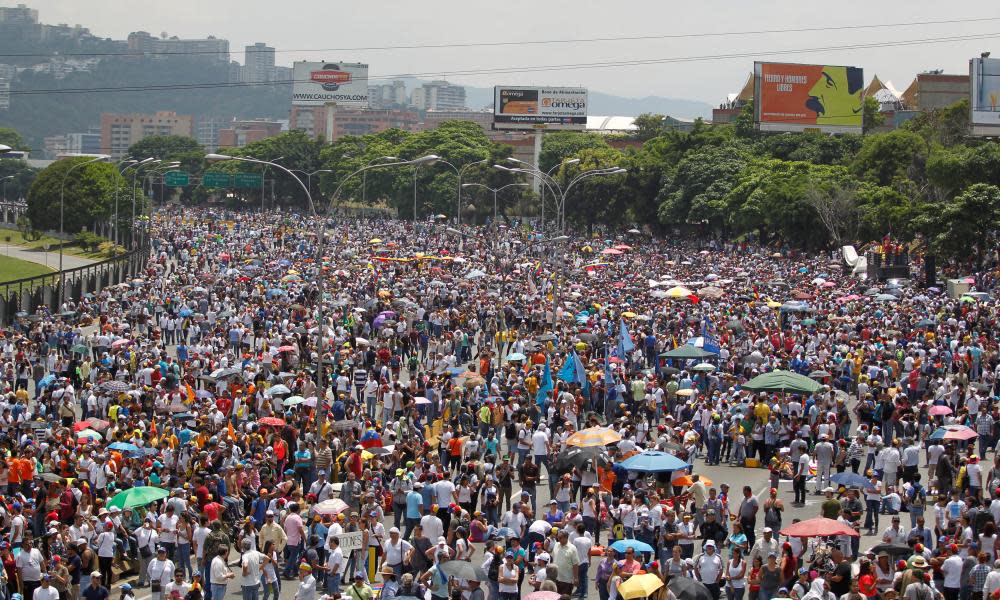The Guardian view on Venezuela: a country in pain | Editorial

Venezuela’s president Nicolás Maduro has failed his country. Picked by Hugo Chávez as successor just before his death in 2013, President Maduro has been an incompetent leader in hard times. He has failed to address the economic crisis triggered when the fall in the price of oil exposed the weaknesses of Chavismo, his predecessor’s ambitious experiment in poverty alleviation and social ownership. Now, in what was once South America’s richest country, more than four households in five are in poverty, twice the level of when he came to power. Babies and children die for lack of access to commonplace medicines. Murder and kidnapping for ransom are rife. Inflation is running above 800%; the economy is contracting sharply. Democracy itself is being eroded as the president defends his faltering grip on power. Weeks of protests have been met by state violence, semi-official vigilantes and, increasingly, counterattack from some opposition groupings. There is a wretched stalemate; and there is a real fear that violence could soon escalate out of control.
Like many of its neighbours, Venezuela’s democrats have to overcome a troubled history of rule by elites with little concern for lifting people out of poverty or shared economic growth. For more than a decade, Chávez seemed to offer a better prospectus: decent housing, proper wages and a fairer future. But after his premature death, the fall in oil prices laid bare the old divisions. His detractors point to a mixture of corruption and his failure to set up a Norwegian-style wealth fund to invest some of an oil income that approached $1tn as causes of the crisis. His defenders accuse the old ruling elite and its supporters of sabotaging the revolution.
But in the past few days, there is a sense that a bridge has been crossed. For the first time, demonstrators have included people from the poorer parts of Caracas, the people who were at the heart of the Chavismo project. Mr Maduro is talking about resuming talks with the opposition, brokered by the Vatican. But there is deep cynicism about these overtures. The opposition suspect him of playing for time, and remember bitterly that the last time they placed their trust in the Vatican’s involvement the talks soon foundered on the president’s obduracy.
Venezuela is in great danger. This stand-off can only be resolved if both sides make some big and difficult decisions. The opposition must accept that protests on their own will not force the Maduro government from office, and that increasing violence on their side risks appearing to justify the use of force by the government. Instead, it must, in the words of one close observer, find a better way of increasing its leverage. That means uniting around concrete objectives such as a timetable for local and governorial elections. It means uniting behind a single leader, a putative presidential candidate that all factions trust – a tall order when one pre-eminent leader, Leopoldo López, is in prison and another, Henrique Capriles, has been banned. They must acknowledge that Chavismo still has a real hold on the hearts of many Venezuelans and any future settlement must make space for it; it cannot be the kind of exercise in revenge that has been seen too often in other South American countries.
Conspicuous respect for constitutionality for the opposition. On the other side, a genuine commitment to negotiation. Bringing the president and his allies to talk may take personal sanctions. Those would have to be imposed by a multilateral group of nations. Any direct action by the US alone plays straight into the Maduro narrative of American intervention. The international community could make the presidential elections due at the end of next year the target for settlement, and international pariah status the penalty for failing to reach it. These are immensely challenging ambitions; there are not even obvious trusted mediators. But the alternative is a dysfunctional country that brings nothing but insecurity and suffering to its citizens. And that never ends well.

 Yahoo News
Yahoo News 
